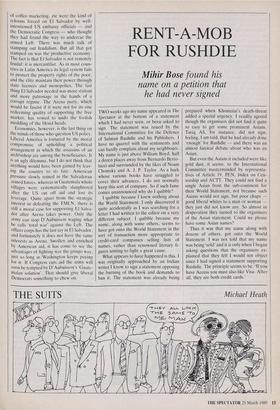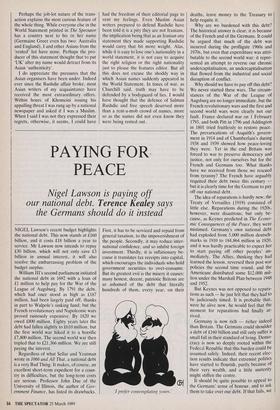RENT-A-MOB FOR RUSHDIE
Mihir Bose found his
name on a petition that he had never signed
TWO weeks ago my name appeared in The Spectator at the bottom of a statement which I had never seen, or been asked to sign. The statement was issued by the International Committee for the Defence of Salman Rushdie and his Publishers. 1 have no quarrel with the sentiments and can hardly complain about my neighbours. My name is just above William Boyd, half a dozen places away from Bernardo Berto- lucci and surrounded by the likes of Noam Chomsky and A. J. P. Taylor. As a hack whose various books have struggled to cover their advances, I do not normally keep this sort of company. So if such fame comes unannounced why do I quibble?
I quibble because I knew nothing about the World Statement. I only discovered it quite accidentally as I was searching for a letter I had written to the editor on a very different subject. I quibble because my name, along with some others, seems to have got onto the World Statement in the sort of transaction more appropriate to credit-card companies selling lists of names, rather than renowned literary fi- gures uniting to fight a great cause. What appears to have happened is this. I was originally approached by an Indian writer I know to sign a statement opposing the burning of the book and demands to ban it. The statement was already being prepared when Khomeini's death-threat added a special urgency. I readily agreed though the organisers did not find it quite so easy to get some prominent Asians. Tariq Ali, for instance, did not sign, feeling, I am told, that he had already done 'enough' for Rushdie — and there was an almost farcical debate about who was an Asian.
But even the Asians it included were like gold dust, it seems, to the International Committee masterminded by representa- tives of Article 19, PEN, Index on Cen- sorship and ACTT. They could not find a single Asian from the sub-continent for their World Statement, not because such Asians would not sign, but poor chaps — good liberal whites to a man or woman — they just did not know any. So almost in desperation they turned to the organisers of the Asian statement. Could we please have some Asian names?
Thus it was that my name along with dozens of others, got onto the World Statement. I was not told that my name was being 'sold' and it is only when I began asking questions that the organisers ex- plained that they felt I would not object since I had signed a statement supporting Rushdie. The principle seems to be, 'If you have Access you must also like Visa. After all, they are both credit cards.'
Perhaps the job-lot nature of the trans- action explains the most curious feature of the whole thing. While everyone else in the World Statement printed in The Spectator has a country next to his or her name (Germaine Greer even has two: Australia and England), I and other Asians from the `rented' list have none. Perhaps the pro- ducer of this statement thought that to put `UK' after my name would detract from its Asian 'authenticity'.
I do appreciate the pressures that the Asian organisers have been under. Indeed ever since the Rushdie affair broke, most Asian writers of my acquaintance have received the most extraordinary offers. Within hours of Khomeini issuing his appalling threat I was rung up by a national newspaper and asked if I was a Muslim. When I said I was not they expressed their regrets, otherwise, it seems, I could have had the freedom of their editorial page to vent my feelings. Even Muslim Asian writers prepared to defend Rushdie have been told it is a pity they are not Iranians, the implication being that as an Iranian any statement they made supporting Rushdie would carry that bit more weight. Alas, while it is easy to lose one's nationality in a world statement, it is not easy to acquire the right religion or the right nationality just to please the features editor. But all this does not excuse the shoddy way in which Asian names suddenly appeared in the World Statement. In times of war, as Churchill said, truth may have to be defended by a bodyguard of lies. I would have thought that the defence of Salman Rushdie and free speech deserved more than a rent-a-mob crowd of names, more so as the names did not even know they were being rented out.



















































 Previous page
Previous page